Lump Charcoal vs. Briquettes – Which is Better?
Everyone is passionate about something. From cars to phones to food, opinions run vast and far.
In the passionate world of outdoor cooking, few topics kindle as much debate as the choice between gas and charcoal or lump charcoal and briquettes. Each has its fervent advocates, ready to defend their preferred fuel with the zeal of a pitmaster guarding their secret rub recipe. But beyond personal preference, this choice touches on deeper aspects of grilling culture: flavor, convenience, tradition, and innovation.
Both have been used for years to grill terrific dishes, and proponents of each have strong feelings about the other. This exploration aims to illuminate the nuanced differences between lump charcoal and briquettes, empowering you to choose the one that best suits your grilling style and culinary ambitions.
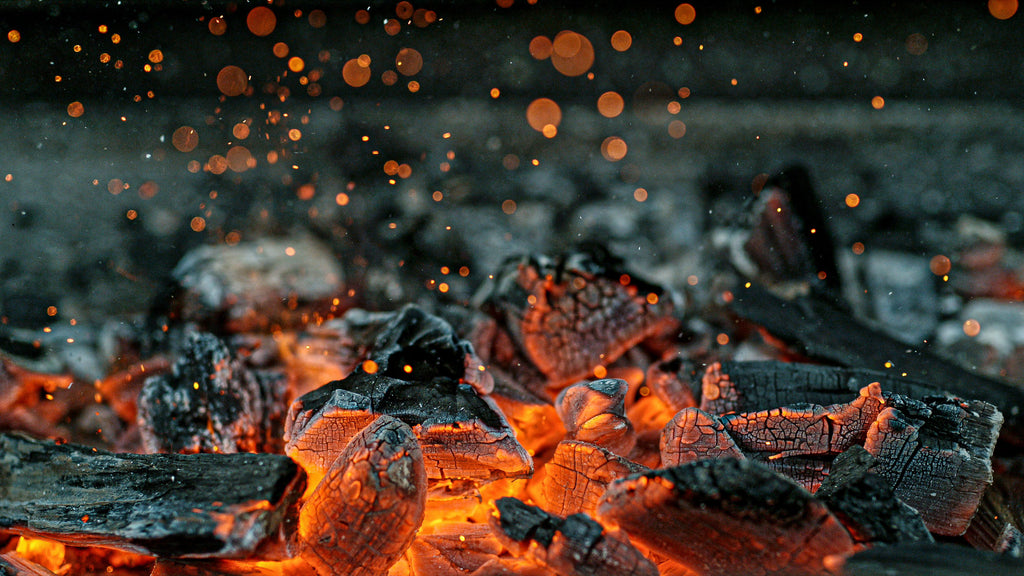
Lump Charcoal vs. Briquettes: Similarities
Charcoal in both forms is made by burning wood in the absence of oxygen until all the natural chemicals, sap, and moisture are consumed. The resulting charcoal is mostly carbon, great for high-temperature cooking, and imparts an adored mesquite smoky flavor and aroma. The wood's flavor has more to do with the climate from where the tree grows than the actual type of wood; however, all charcoal is made from hardwood, such as oak, hickory, cherry, mesquite, pecan, and apple.
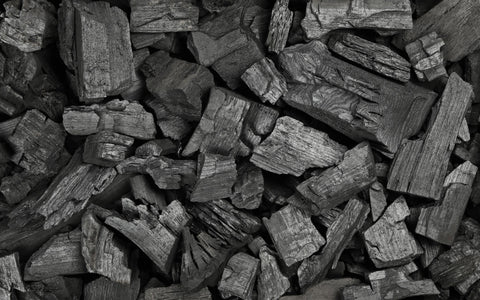
What is Lump Charcoal?
Lump charcoal, the purest form of charcoal for grilling enthusiasts, originates from pieces of hardwood. This process yields chunks of charcoal in various sizes, known as "lumps." One of the standout qualities of lump charcoal is its high carbon content, which allows it to burn hotter and more quickly than its counterpart, briquettes while producing minimal ash. This makes it a top pick among professional grillers and hobbyists, especially those looking to achieve a perfect sear or manage shorter grilling sessions. Despite its benefits, some users find the irregular size of lump charcoal a bit tricky, mainly when aiming for those long, slow cooks that barbecue aficionados adore.
Moreover, lump charcoal is celebrated for its natural composition. Free from additives or fillers, it ensures that no unwanted chemical odors or flavors find their way into your food, preserving the authentic taste of your grilled masterpieces. Nonetheless, it's always a good practice to glance over the packaging and ingredients list when making your purchase, ensuring you're bringing home a product that's as pure as the flavor it promises to deliver.
Pros:
- Higher Heat: Ideal for achieving a searing high heat, lump charcoal can elevate your grilling game, bringing out the best in your meats and vegetables.
- Pure Flavor: With no added chemicals or fillers, lump charcoal ensures that the only flavors hitting your palate are those of your carefully prepared dishes.
- Minimal Ash: Less ash production means easier cleanup, allowing you to focus more on the joy of grilling and less on the aftermath.
- Quick Lighting: Lump charcoal lights faster than briquettes, getting you from prep to plate in less time.
- Eco-Friendly Choice: Lump charcoal, often made from renewable resources, is a greener option for the environmentally conscious griller.
Cons:
- Inconsistent Burn Times: Due to the varied sizes of lump charcoal, maintaining a consistent temperature for longer cooks can be challenging.
- Cost: Lump charcoal generally costs more than briquettes, which might be a consideration for regular grillers.
- Variable Sizes: Lump charcoal pieces' irregular shape and size can make achieving an even cooking surface for "low and slow" recipes complex.
- Availability: Depending on your location, lump charcoal may not be as readily available as briquettes, requiring more effort to source.
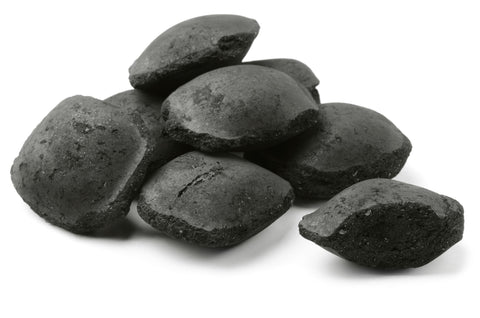
Charcoal Briquettes - An American Staple
In the heart of American grilling tradition lies the charcoal briquette, a compact and convenient fuel source that has warmed grills and hearts for generations. Created from sawdust and leftover wood, these remnants are transformed through burning and shaping into uniform blocks, thanks to molds. Adding fillers as binders and chemical additives ensures these briquettes can be quickly released from their molds, presenting a consistent size that grill masters have come to rely on for various cooking techniques.
While it's true that briquettes may not reach the searing temperatures of lump charcoal and tend to leave behind more ash due to their binders, their longer burn time offers a steady heat that's ideal for extended smoking sessions or slow roasting to perfection.
Briquettes have earned their place as a favored fuel choice primarily due to their affordability and uniformity. This consistency makes temperature control more manageable, particularly for the long, leisurely cooks who define the art of barbecue. However, there's a conversation to be had about the additives and fillers within briquettes. Some enthusiasts express concerns over chemical odors that could influence food flavor.
Pros:
- Consistent Size and Burn: Briquettes' uniform shape makes them incredibly user-friendly, offering predictable and manageable heat for various grilling styles.
- Cost-Effective: Generally more affordable than lump charcoal, briquettes provide a budget-friendly option for regular grillers.
- Longer Burn Time: Briquettes are ideal for smoking or slow-roasting. They sustain their heat over extended periods, making them perfect for dishes that require patience and precision.
- Charcoal briquettes are widely available at most stores, making them convenient for your impromptu weekend barbecue or planned gathering.
Cons:
- Chemical Additives: The additives that help briquettes maintain their form can also raise concerns about chemical smells and potential taste transfer to food.
- More Ash Production: Due to the binders used in their construction, briquettes produce more ash than lump charcoal, meaning more cleanup is necessary.
- Lower Heat Output: Briquettes generally reach a lower max temperature than lump charcoal if you're aiming for the perfect sear.
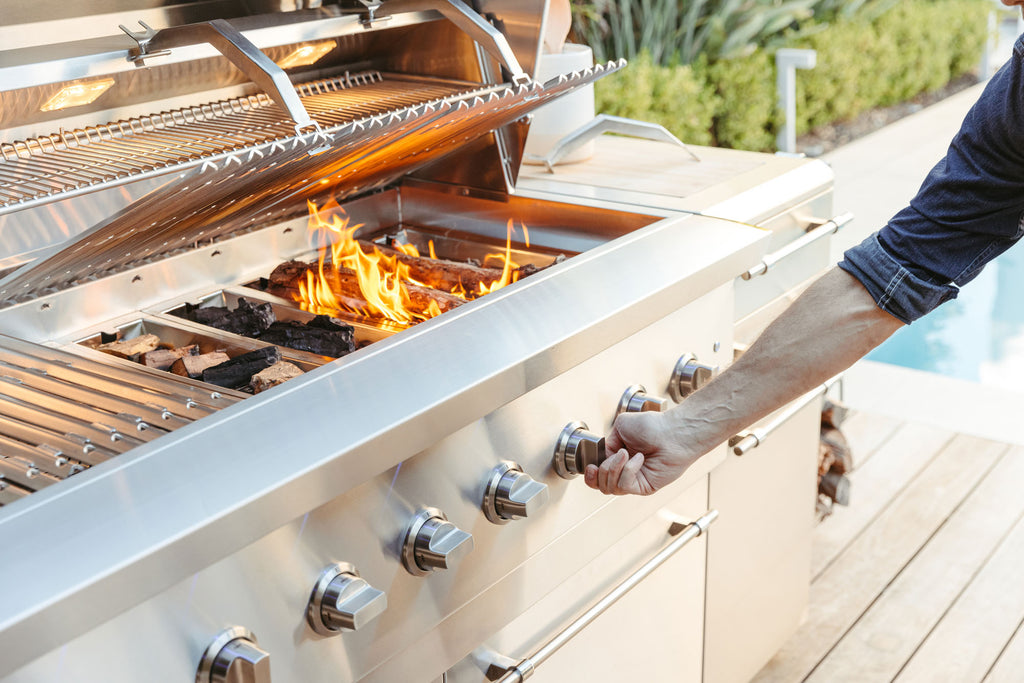
The Hybrid Grill Series from American Made Grills
The Hybrid Grill Series by American Made Grills is where the age-old debate meets modern versatility. This innovative lineup is crafted for those who believe in freedom of choice and refuse to be pinned down by a single method of grilling. Here's why the Hybrid Grill Series is revolutionizing outdoor cooking: It offers a seamless blend of tradition and innovation for an unmatched culinary adventure.
-
Flexibility at Your Fingertips: The cornerstone of the Hybrid Grill Series is its unparalleled flexibility. Why choose between gas and charcoal when you can master both? Start with gas's push-button convenience to get the grill hot and ready, then switch to charcoal or wood to infuse your dishes with that coveted, smoky depth of flavor. This ability to adapt on the fly means you're always equipped to match your fuel to your food, mood, or weather.
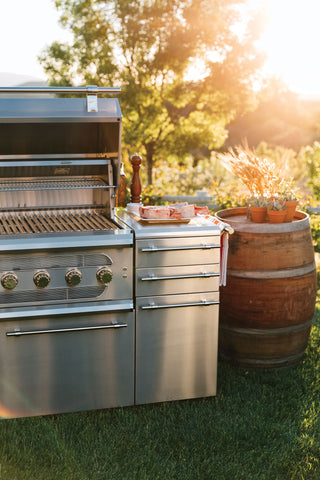
- Craftsmanship That Lasts: Every grill in the Hybrid Grill Series is a testament to American Made Grills' commitment to quality. Built to endure, these grills feature robust materials and thoughtful engineering, ensuring they are ready to tackle countless cookouts. From spontaneous weeknight dinners to grand weekend feasts, your Hybrid Grill is a reliable companion through every grilling season.
- Enhanced Cooking Experience: These grills are adaptable and durable but also come loaded with features designed to elevate your grilling game. Adjustable heat zones allow for precise temperature control, making it easy to juggle different dishes simultaneously. Meanwhile, the ease of cleanup ensures that your focus remains on the joy of cooking rather than the dread of aftercare.
The American Made Grills Hybrid Grill Series is more than just a tool for outdoor cooking; it embodies the spirit of culinary exploration. These grills can switch between gas, lump charcoal, briquettes, and wood, inviting you to expand your horizons and experiment with previously unattainable flavors and techniques.
Whether you're a die-hard charcoal enthusiast, a gas-grill purist, or somewhere in between, the Hybrid Grill Series promises a grilling experience that respects tradition while embracing the possibilities of today's outdoor kitchen.
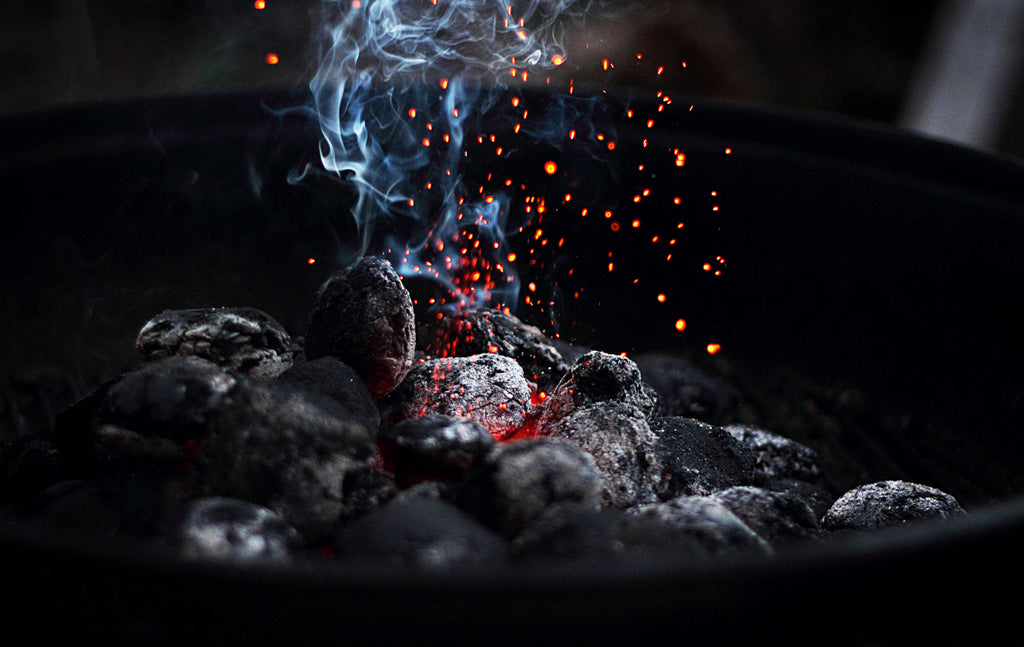
So, Which is the Better Charcoal – Lump or Briquettes?
Most experts agree that each has its advantages and disadvantages. Lump charcoal is considered purer and healthier for those practicing an organic lifestyle. Proponents of briquettes argue that lump is expensive and too difficult to work with for anything longer than searing burgers or steak. There is truth on both sides, but natural briquettes are readily available, and it is possible to control the heat of lump charcoal with practice.




